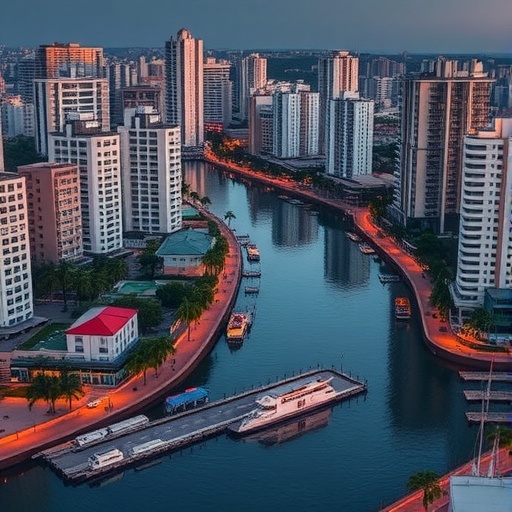In the realm of urban studies, researchers constantly explore the multifaceted interactions between human activity and environmental shifts. One such study that captures this intricate relationship is led by Medeiros, M.O., da Silva, L.B., and de Oliveira Júnior, J.F., focusing on the climate dynamics in João Pessoa, Brazil. This research dives deep into the overheating challenges posed by urbanization, illuminating how urban heat islands emerge and affect thermal comfort for residents in metropolitan areas.
Urban heat islands (UHIs) signify a pressing concern, as they contribute to increased temperatures in cities compared to surrounding rural areas. The phenomenon occurs primarily due to the extensive presence of concrete, asphalt, and other materials that absorb and retain heat. In João Pessoa, a city known for its tropical climate, this issue can severely impact the well-being of its inhabitants. The implications of these increased temperatures can be both immediate in terms of discomfort and long-term, affecting health and energy consumption patterns.
The study meticulously evaluates how the relentless march of urbanization interacts with local climates, especially concerning heat accumulation in urban centers. By employing satellite imagery and climate modeling, the researchers quantify temperature variations and discern their sources related to urban development. This methodology allows for a comprehensive analysis, revealing which areas are most susceptible to UHI effects.
Medeiros and his colleagues highlight that infrastructure planning plays a vital role in mitigating the adverse effects of UHIs. Urban planning that incorporates greenery, such as parks and green roofs, can effectively lower surface temperatures. These natural elements serve as urban cooling agents, enhancing overall thermal comfort for residents. The understanding of these interactions is critical, especially in a city where the thermal dynamics of the environment can rapidly change with urban sprawl.
Furthermore, the study underscores the socio-economic implications of thermal discomfort due to rising heat levels. Heat can exacerbate pre-existing health conditions, lead to increased energy demand for cooling, and elevate energy costs. For lower-income communities, who may lack access to adequate air conditioning, the consequences can be dire. The researchers argue that addressing thermal discomfort must also involve social equity, ensuring that all residents have access to cooling technologies and green spaces.
The study also discusses how climate change is likely to intensify UHI effects. As global temperatures continue to rise, cities like João Pessoa may experience more frequent and severe heat episodes. This projection necessitates a proactive approach in urban planning and climate adaptation strategies. Engaging local communities in discussions about climate resilience can foster innovative solutions tailored to the unique challenges faced by urban dwellers.
The researchers advocate for the integration of interdisciplinary strategies combining urban planning, public health, and environmental science. By fostering collaboration among these fields, cities can develop comprehensive frameworks that not just address the symptoms of UHI but tackle the root causes inherently tied to urban development practices. Policies supporting sustainable urban growth will help create environments where residents can thrive despite the impending challenges brought on by climate change.
As urban centers continue to expand, understanding the relationship between urbanization and thermal comfort will become increasingly vital. The findings from Medeiros et al. offer crucial insights that can inform future research and guide policymakers. It encourages a shift towards more resilient urban environments, fostering spaces that accommodate the needs of both people and the planet.
This research emphasizes the critical importance of sustainable urbanization, urging cities around the globe to heed the lessons arising from João Pessoa’s experiences. It illustrates how strategic interventions can successfully ameliorate the impacts of urban heat islands and create a healthier, more comfortable urban living environment.
Conclusively, the study by Medeiros and his team raises important questions regarding the sustainability of urban growth. As climate impacts become more pronounced, decision-makers must confront the realities of urban heat islands and their consequential effects on public health and comfort. The road ahead requires thoughtful planning, innovative solutions, and a commitment to equitable access to green and comfortable living spaces.
In the face of growing urbanization challenges, lessons from localized studies will undoubtedly contribute to broader conversations about climate resilience. Urbanization may seem inevitable, but how cities adapt to these changes can define the quality of life for millions. Sustaining urban communities in the age of climate change requires not only foresight but also a willingness to demand greener, smarter planning practices that align with the needs of their populations.
By addressing urban heat islands and their complexities, researchers like Medeiros and colleagues shine a light on a path forward, one that harmonizes urban development with the urgencies of climate adaptation. As cities continue to evolve, these considerations must remain at the forefront of urban planning agendas.
Subject of Research: Urbanization effects on urban heat islands and thermal comfort in João Pessoa, Brazil
Article Title: Interactions between urbanization, heat islands, and thermal comfort in João Pessoa, Brazil.
Article References: Medeiros, M.O., da Silva, L.B., de Oliveira Júnior, J.F. et al. Interactions between urbanization, heat islands, and thermal comfort in João Pessoa, Brazil. Environ Sci Pollut Res (2025). https://doi.org/10.1007/s11356-025-37148-y
Image Credits: AI Generated
DOI: https://doi.org/10.1007/s11356-025-37148-y
Keywords: Urban heat islands, thermal comfort, urbanization, João Pessoa, climate change, sustainable urban development, public health, environmental science.




